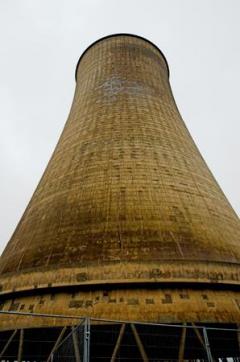Mannin : nuclear sites delicensing - Dolge respond

The Isle of Man Department of Local Government and the Environment (DOLGE) have said they were not consulted by the United Kingdom Health and Safety Executive about proposals on the criterion for Delicensing Nuclear Sites.
The Celtic League Director of Information had written to the Isle of Man Department of Local Government (DOLGE) Minister, John Shimmin MHK, asking for the Departments views when the League was consulted by the United Kingdom Health and Safety Executive over Nuclear Sites Delicensing Criteria, specifically 'Guidance to Inspectors'.
The League suggested that if possible the League and the Manx government should try to achieve a consensus in any response to British governments initiatives and said we would welcome DOLGE's view.
Whilst we are surprised that the Manx government has not been directly consulted, DOLGE set out a fairly comprehensive statement on the Isle of Man position which is set out in full below :
«Dear Mr. Moffatt,
UK Health and Safety Executive (HSE) Document on Delicensing Nuclear Sites
Thank you for your letter of 12th January 2008 addressed to the Minister for DLGE which mentioned the HSE document entitled 'HSE Criterion for Delicensing Nuclear Sites' (2005) and your reference to the HSE preparing an associated 'Guidance for Inspectors' document. The Minister asked me to respond to your letter and although I did prepare a draft response at the time it seems I never sent the final version, so please accept my apologies for the delay in responding.
Following a check of our files, I can advise that my Department has no record of being invited by the HSE to comment on either the 'Criterion' document or subsequently, any related 'Guidance for Inspectors' document. The Department has not had an opportunity to examine a draft of any related 'Guidance for Inspectors' document and therefore the Department is unable to comment on that document at this time.
However, the fact that the HSE did not invite our comments on the aforementioned 'Criterion for Delicensing' document has not given the Department any cause for concern as we can find no fault witft the content of the HSE document.
The 'HSE Criterion for Delicensing' document is a policy statement, subject to periodic review by the HSE and, in the particular case of Sellafield, could only be applied in the distant future. More importantly the HSE document appears consistent with 'core' European legislation; in particular the EU Basic Safety Standards Directive which itself is derived from the 1957 EURATOM Treaty. The text of the HSE document therefore seems well-founded in my Department's estimation in established UK and EU legislation, and my officials are content with the text as it presently stands
I should also now like to outline how the Department is responding to the nuclear issue you describe as “the run down and delicensing of nuclear sites” with particular reference to the Sellafield site and potential adverse impacts on the Isle of Man.
The Department takes the view that the 'possibility' of delicensing of Sellafleld is best considered in the overall context of the 'Site Lifetime Plan' for Sellafield. Indeed, in the case of Sellafield, the existing Nuclear Industry & Regulatory planning for the future of the site refers to : phases of decommissioning ; near term work plans ; a Site End State and the Site lifetime Plan (i.e. the entirety of projected work at Sellafield over a 100 year timescale). It is particularly true for Sellafield that delicensing of the largest part of the site is unlikely to be a practical option certainly in the near term, and it is more likely that the major part of the site will remain under long-term institutional (regulatory) control, In contrast, the UK's nuclear power station sites do have better prospects for eventual delicensing.
Therefore with due regard for the planned chronology for decommissioning of Sellafleld, the Department has been increasing its involvement(in terms of consultation and engagement) with the appropriate UK Agencies and Government Departments which will be taking the major decisions regarding Sellafield's future. The Department is particularly involved in on-going dialogue with the Nuclear Decommissioning Authority (NDA) who own the site.
Sellafield's current operator 'Sellafield Ltd' and the Nuclear Industry Regulators are also involved in developing and progressing near term plans that are required to decommission redundant facilities and, in particular, the so called 'high hazard' facilities at Sellafield. The Department has therefore also been involved in various stakeholder engagement activities organised both by Sellafield Ltd and relevant UK Government Departments. Several of the aforementioned consultation meetings have examined the options for the Site End state(s) for the four 'licensed' West Cumbrian sites: Sellafield; Windscale; Calder Hall and the Low Level Waste site near Drigg village.
In taking part in all of the above dialogue and consultations, the Department has been mindful of established Isle of Man Government policy as adopted by Tynwald Court in October 2002. Furthermore, although my Department gives qualified support to the Nuclear Decommissioning Authority's efforts to dismantle and remove redundant nuclear facilities, it has the expectation that all activities connected with the decommissioning of Sellafield shall have no harmful impact on the Isle of Man, and that any unavoidable radioactive pollution should be limited to the greatest extent technically possible.
Lastly, my Department fully recognises that the well-being of Isle of Man residents is wholly dependent on the Isle of Man's clean and safe environment, and therefore will continue to oppose any radioactive pollution of the environment, whether by accidental or authorised release, and most certainly where there is a potential to damage our environment and economic interests.
Yours sincerely,
K Kinrade Chief Executive.»
Related article on Celtic News at:
(voir le site) (voir le site) (voir le site)
J B Moffatt Director of Information Celtic League
03/04/08
■